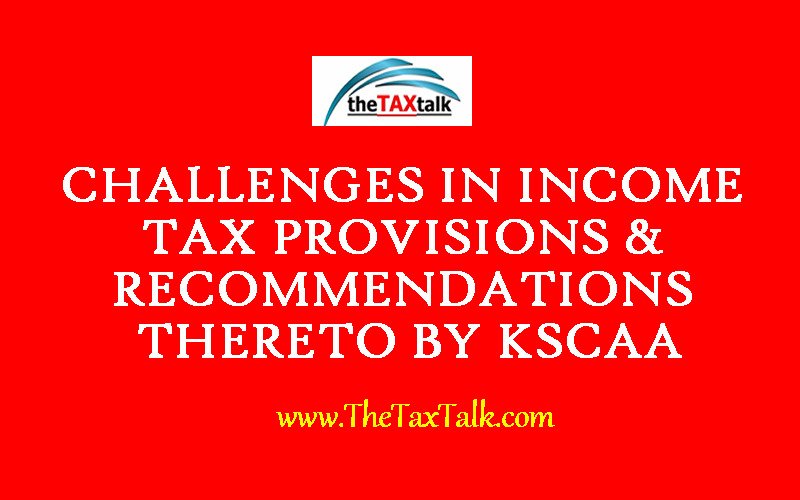![]()
CHALLENGES IN INCOME TAX PROVISIONS & RECOMMENDATIONS THERETO BY KSCAA
Date:10th March, 2022
To,
The Principal Chief Commissioner of Income Tax, Karnataka& Goa
Bengaluru
Respected Sir,
SUBJECT:CHALLENGES IN INCOME TAX PROVISIONS & RECOMMENDATIONS THERETO
The Karnataka State Chartered Accountants Association (R) (in short ‘KSCAA’) is an association of Chartered Accountants, registered under the Karnataka Societies Registration Act, in the year 1957. KSCAA is primarily formed for the welfare of Chartered Accountants and represents before various regulatory authorities to resolve the professional problems faced by chartered accountants and business community.
In the past, we have written to your good selves many a times populating various issues, challenges and hardships being faced by taxpayers and Chartered Accountants and suggested possible solutions on the same. Through this representation, we would like to bring to your kind notice, few of the practical issues being faced by taxpayers and Chartered accountants as regards certain provisions in the Income Tax Act, 1961 and implementation thereof. For every issue, challenge or hardship highlighted, we have also made suggested solutions to address them all.
-
RECTIFICATION PROCEEDINGS
Provisions of section 154(8):
“Without prejudice to the provisions of sub-section (7), where an application for amendment under this section is made by the assessee or by the deductor or by the collector on or after the 1st day of June, 2001 to an income-tax authority referred to in sub-section (1), the authority shall pass an order, within a period of six months from the end of the month in which the application is received by it..”
Challenges:
-
Though there is a statutory mandate that the rectification order has to be passed within 6 months from the end of the month in which the application is received, however this mandate is not being followed.We have noticeddelay of more than 2 years in most of the cases;
-
Despite the delay on the part of Jurisdictional Assessing Officers, the applications are not being attended by wrongly citing the limitation under section 154(7) of the Act.
-
Rectifications applications filed before the CPC are being rejected by way of non-speaking orders. In most cases, the reason for rejection is ‘Contact jurisdictional AO’.
-
Recovery notices are being sent on automated basis without considering the pending rectification applications.
Our Suggestions:
-
Launch a drive to clear pending rectification applications by dedicating a fortnight (or any fixed timeframe) for the same;
-
Suspend recovery measures in caseswhererectification application is pending before the Assessing Officer;
-
Bring rectification proceedings under the Faceless Scheme;
-
Follow the provisions of section 154(8) in true spirit;
-
Prescribe ‘Standard Operating Procedures’ for submissions of documents and processing of the applications under section 154;
-
To host webinars/seminars on awareness of the provisions of rectificationfor the benefit of assessees.These sessionscan be conducted jointly by an income tax expert (CAs) and officers from the department.
-
To condone the delay in filing rectification or to relax the limitation as mentioned in section 154(7) of the Act;
-
Demands prior to AY 2010-11 that are due to TDS credit mismatchto be taken up on immediate/suo moto basis;
-
Suspend automated refund adjustments pending rectification application
-
ORDER GIVING EFFECT
Provisions of section 153:
“(5) Where effect to an order under section 250 or section 254 or section 260 or section 262 or section 263 or section 264 is to be given by the Assessing Officer, wholly or partly, otherwise than by making a fresh assessment or reassessment, such effect shall be given within a period of three months from the end of the month in which order under section 250 or section 254 or section 260 or section 262 is received by the Principal Chief Commissioner or Chief Commissioner or Principal Commissioner or Commissioner, as the case may be, the order under section 263 or section 264 is passed by the Principal Commissioner or Commissioner:
Provided that where it is not possible for the Assessing Officer to give effect to such order within the aforesaid period, for reasons beyond his control, the Principal Commissioner or Commissioner on receipt of such request in writing from the Assessing Officer, if satisfied, may allow an additional period of six months to give effect to the order:
Provided further that where an order under section 250 or section 254 or section 260 or section 262 or section 263 or section 264 requires verification of any issue by way of submission of any document by the assessee or any other person or where an opportunity of being heard is to be provided to the assessee, the order giving effect to the said order under section 250 or section 254 or section 260 or section 262 or section 263 or section 264 shall be made within the time specified in sub-section (3)..”
Challenges:
-
Though there is a mandate that the Order Giving Effect (OGE) has to be passed within 3months (or an extended period of 9 months) from the relevant period, this timeline is not being followed. In various cases there is delay of more than 2 years and this undue delay is leading to miscarriage of justice;
-
In some cases, the efforts involved to obtain the OGE is significant compared to the efforts in representing the case on merits at higher forum;
-
In many cases, recovery notices are sent on automated basis without considering the pending OGE;
-
These delays are also leading to assessees going into a cash crunch, since 20%(or such higher amount) towards disputed demand would already be deposited;
-
There are instances of refund being withheld without providing any reasons, even when OGE is passed. This is against the principle of natural justice.
Our Suggestions:
-
Launch a drive to clear pending OGEs by dedicating a fortnight (or any fixed timeframe) for the same;
-
Suspend recovery measures in caseswhere such applicationsare pending before the Assessing Officer;
-
Bring these proceedings under the Faceless Scheme and instruct the AOs to take this on suo-moto basis;
-
Follow the provisions of section 153 in true spirit;
-
Prescribe ‘Standard Operating Procedures’ for effective implementation of the provisions
-
To host webinars/seminars on awareness of the provisions of rectification for the benefit of assessees.The session can be conducted jointly by an income tax expert (CA) and an officer from the department.
-
Ensure that refund adjustments are made only by providing valid reasons.
-
DELAY IN PROCESSING OF REFUND
Challenges:
-
The processing of ITRs for AY 2021-22 have been delayed in many cases and as a resultant, refund is also delayed. This is causing genuine hardship to the assessees;
-
There are instances of delay in processing refund determined vide OGE in VivadSe Vishwas Scheme(VSVS) cases. In the 2021 budget speech, our Hon’ble Finance Minister Smt. Nirmala Sitharaman mentioned that the refunds under VSVS would be cleared in March 2021;
-
In cases where there are delays in processing of refund, the AOs direct us to approach CPC. However, there is no dedicated contact details for the refund processing;
-
Refund adjustments under section 245 of the Act are made arbitrarily, without considering our replies to the outstanding demand;
-
In few cases, the “Response to outstanding demand” tab is not yet activated on the portal. But notice for adjustment of demand against refund is issued and adjustedunder section 245, thereby denying the assessee an opportunity of being heard;
-
The demand reflected on the income tax portal under the tab ‘response to outstanding demand’ are not being rectified in timely manner. This is resulting in undue adjustmentof refunds;
-
Grievancesraised on delayed refunds are not being resolved on timely basis. In some cases, the petitions are being disposed of by way of issuing nonspeaking order.
-
DELAY IN PROCESSING LOWER DEDUCTION CERTIFICATES
Challenges and Suggestions:
-
Application for lower deduction certificate is required to be processed within 30 days from the date of filing of form 13. However, the same is generally not happening.
-
The average processing time for form 13 is believed to be more than three months. This delay results in serious cash crunch for the assessees.
-
Queries are being raised at the fag-end of the above limit of 30 days. Thisleads to fresh reckoning of the number of days of pendency;
-
Lack of standard operating procedures is leading to confusion on submission of documents before the authorities;
-
Despite the fact that form 13 submission is made online, the assisting officers insist on print out of all the supporting documents including the application;
-
The basis of processing or rejection of form 13 is not made known to the Assessee. This is against the principle of natural justice.
-
DELAY IN TAX RESIDENCY CERTIFICATES (TRC)
Challengesand Suggestions:
-
Assessees are eligible for TRC on the basis of their residential status. Non-individual assessees, more particularly firms, LLP and companies registered in India are considered as residents by default and therefore TRC should be issued immediately.
-
We have come across instances of delay of over 15 days to process the simple TRC;
-
There are also instances of AOs asking for irrelevant documents to issue TRC, thereby leading to unnecessary delays and compliances;
-
SOP may be considered to bring about consistency in documents sought and processing of TRC;
We are presenting before your good selves the above enumerated issues, challenges and hardships which maybefaced by the trade, industry and professionals due to ineffective implementation of the provisions of the Act. Wherever required, we have also given recommendations for your kind consideration. We herewith earnestly request your good selves to kindly initiate reforms in the system to address various issues we have highlighted above.
We the members of Karnataka State Chartered Accountants Association, on behalf of the entire Chartered Accountants community and also on behalf of the trade and industry in the state of Karnataka appeal to your good selves to kindly consider our above recommendations on various issues populated as above.
Yours sincerely,
For Karnataka State Chartered Accountants Association®
CA.Chandan Kumar Hegde |
CA.Sujatha Raghuraman |
CA.GaneshVShandage |
President |
Secretary |
ChairmanRepresentationCommittee |
Ccto:
-
Nirmala Sitharaman, Hon. Union Minister of Finance and Corporate Affairs, Government of India
-
Bhagwat Karad, Hon’ble Union Minister of State for Finance, Government of India
-
Pankaj Choudhary,Hon’ble Ministerof State for Finance, Government of India
-
Tarun Bajaj, Hon’ble Revenue Secretary, Department of Revenue, Ministry of Finance, Government of India
-
J B Mohapatra, Chairman – Central Board of Direct Taxes


